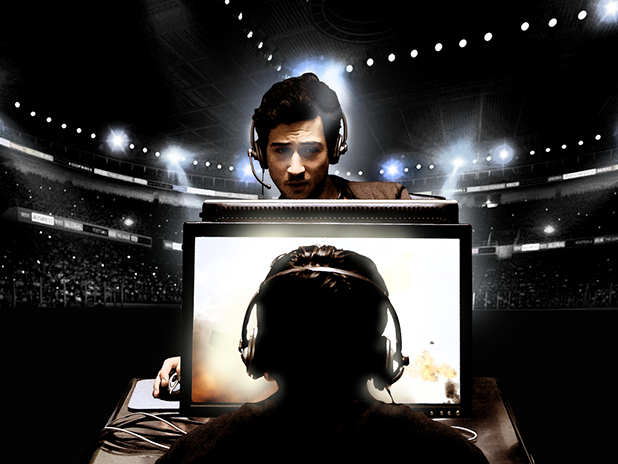Will Watching Other People Play Video Games Become The Next Big Spectator Sport?
The fact that traditional sports outlets have greeted gamers with suspicion is to be expected. A new sport is like a new religion: it threatens to reveal the absurdity of the old forms. Scientology is silly, sure, but no more ridiculous than stories about talking snakes and virgin births. Likewise, a game in which people use their keyboards to build ultra-powerful alien armies is no more inherently absurd than a game in which grown men try to hit a bit of leather-wrapped cork with a stick.
Call it a sport or just a spectacle, competitive gaming is big and—in a crowd full of maniac fans screaming themselves hoarse—it is exciting.
At a sport’s birth, it’s difficult to tell if it’s the next UFC or the next Slamball, the short-lived league that combined all the excitement of basketball with the inherent idiocy of jumping on a trampoline. History is what adds depth and gravitas to what might otherwise seem nakedly absurd. In 2015, the world of eSports has millions of fans and full-time competitors playing for prizes that reach $5 million. It’s undoubtedly professional. Only time makes a silly “game” into something meaningful and dignified.
More than this general skepticism, however, eSport athletes seem to inspire a particular animus. Professional gamers train 8-12 hours a day to stay sharp. At a California eSports lab sponsored by Red Bull, gamers don’t just play the game but deconstruct their technique, using eye tracking technology, following exercise regimes, and running set plays with coaches. Gamers have received athletic visas, there are eSports athletes in the collegiate system, and they competed at this year’s the X-Games. Despite all this, there’s a natural reluctance to call gamers “athletes.”
This April, when ESPN broadcast a Heroes of the Storm tournament on ESPN 2, the move immediately confused and enraged people like ESPN radio personality Colin Cowherd, who was appalled that a video game had aired in the sacrosanct space generally reserved for events like obstacle-course running, hot-dog eating, and spearfishing. “Somebody lock the basement door at mom’s house and don’t let ’em out,” said Cowherd with disgust. “I will quit this network if I am ever asked to cover that. I tolerated Donkey Kong. I’ll tell you what that was the equivalent of… of me putting a gun in my mouth.”
The defensiveness of people like Cowherd—the flagrant nerd-baiting and howls of outrage—feels like the last gasp of particular kind of sports bro traditionalism. We live in a time in which it feels like the nerds have triumphed. Even sports, that last bastion of unreconstructed manliness, can feel like it’s under siege by Moneyball-quoting quants, stations that insist on broadcasting female soccer players, and analysts who treat the epic battles between modern-day gladiators as just so much grist for the data mill. Maybe accepting eSports feels like a step too far. After all, how can something be a “sport” if its grand champion is a skinny Korean who looks like he rarely sees the sun?
At the StarCraft tournament, no one was worrying about these distinctions. Call it a sport or just a spectacle, competitive gaming is big and—in a crowd full of maniac fans screaming themselves hoarse—it is exciting.
Onstage, two announcers (“casters” in the world of gaming) did rapid-fire play-by-play as Hydra tried to hold off Lilbow’s frenzied attacks. “Lilbow really piling on the pressure now!” said the British caster, as Lilbow used his robotic grey stalkers to attack Hydra. The Korean sat in his booth, composed, the long, slim fingers of his left hand articulating across the keyboard like the legs of a spider while his right hand controlled the mouse, zipping this way and that.
On the towering screen, Lilbow’s stalkers crawled backward, repulsed by Hydra’s army. “Hydra has fought this back!” yelled the caster. A steady crush of tiny alien creatures advanced on Lilbow. There was a flash of gunfire, a confusion of pixels, as the volume in the arena swelled and the thundersticks boomed. “Hydra, 4-2 is able to win the championship, is able to go the distance!” yelled the caster over the screaming crowd.
Hydra smiled. He walked to the centre of the stage, pumped his fists above his head, and picked up the trophy while silver confetti exploded into the crowd—the champion of a new sport, or something close to it.










